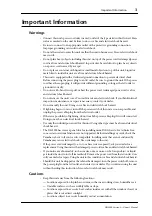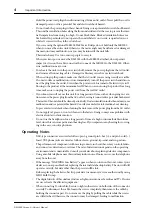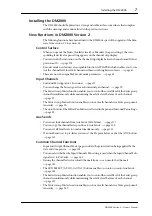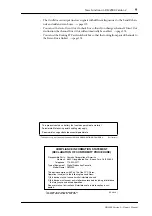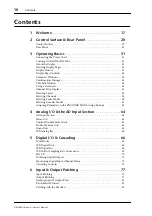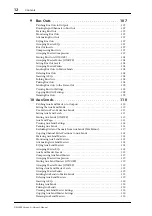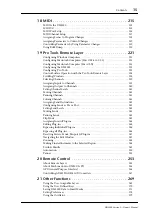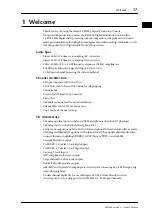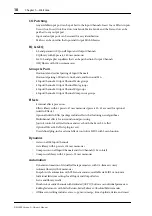
6
Important Information
DM2000 Version 2—Owner’s Manual
Copyright
No part of the DM2000, its software, or this
Owner’s Manual
may be reproduced or distrib-
uted in any form or by any means without the prior written authorization of Yamaha Cor-
poration.
© 2003 Yamaha Corporation. All rights reserved.
Yamaha Web Site
Further information about the DM2000, related products, and other Yamaha professional
audio equipment is available on the Yamaha Professional Audio Web site at:
<http://www.yamahaproaudio.com/>.
Package Contents
•
DM2000 Digital Production Console
•
CD-ROM
•
Power cord
•
This manual
•
Studio Manager Installation Guide
Optional Extras
•
MB2000 Peak Meter Bridge
•
SP2000 Wooden Side Panels
•
LA1800 Light Gooseneck
•
mini YGDAI I/O cards
About this Owner’s Manual
This
Owner’s Manual
covers the DM2000 Digital Production Console.
All the information you need in order to operate the DM2000 Digital Production Console
is contained in this manual. Use the table of contents to familiarize yourself with the man-
ual’s organization and to locate tasks and topics, and use the index to locate specific infor-
mation. Before diving in, it’s recommend that you read the “Operating Basics” chapter,
starting on page 51.
Each chapter of this manual discusses a specific section or function of the DM2000. The
Input and Output Channels are explained in the following chapters: “Input Channels,” “Bus
Outs,” “Aux Sends,” “Matrix Sends,” and “Stereo Out.” Where possible, these chapters have
been organized in order of signal flow, from input through to output.
Functions such as EQ and Delay are common to all channels. Rather than repeat the same
information over and over, these functions are explained once in the “Common Channel
Functions” chapter, which starts on page 127. The “Input Channels,” “Bus Outs,” “Aux
Sends,” “Matrix Sends,” and “Stereo Out” chapters contain cross-references to the relevant
sections of the “Common Channel Functions” chapter.
Conventions Used in this Manual
The DM2000 features two types of button: physical buttons that you can press (e.g., ENTER
and DISPLAY) and buttons that appear on the display pages. References to physical buttons
are enclosed in square brackets, for example, “press the [ENTER] button.” References to dis-
play page buttons are not emphasized, for example, “press the ENTER button.”
Display pages can be selected by using the [DISPLAY] buttons or the Left Tab Scroll, Right
Tab Scroll, and F1–4 buttons below the display. In order to simplify explanations, only the
[DISPLAY] button method is mentioned in the procedures. See “Selecting Display Pages”
on page 53 for details on all the ways in which pages can be selected.



